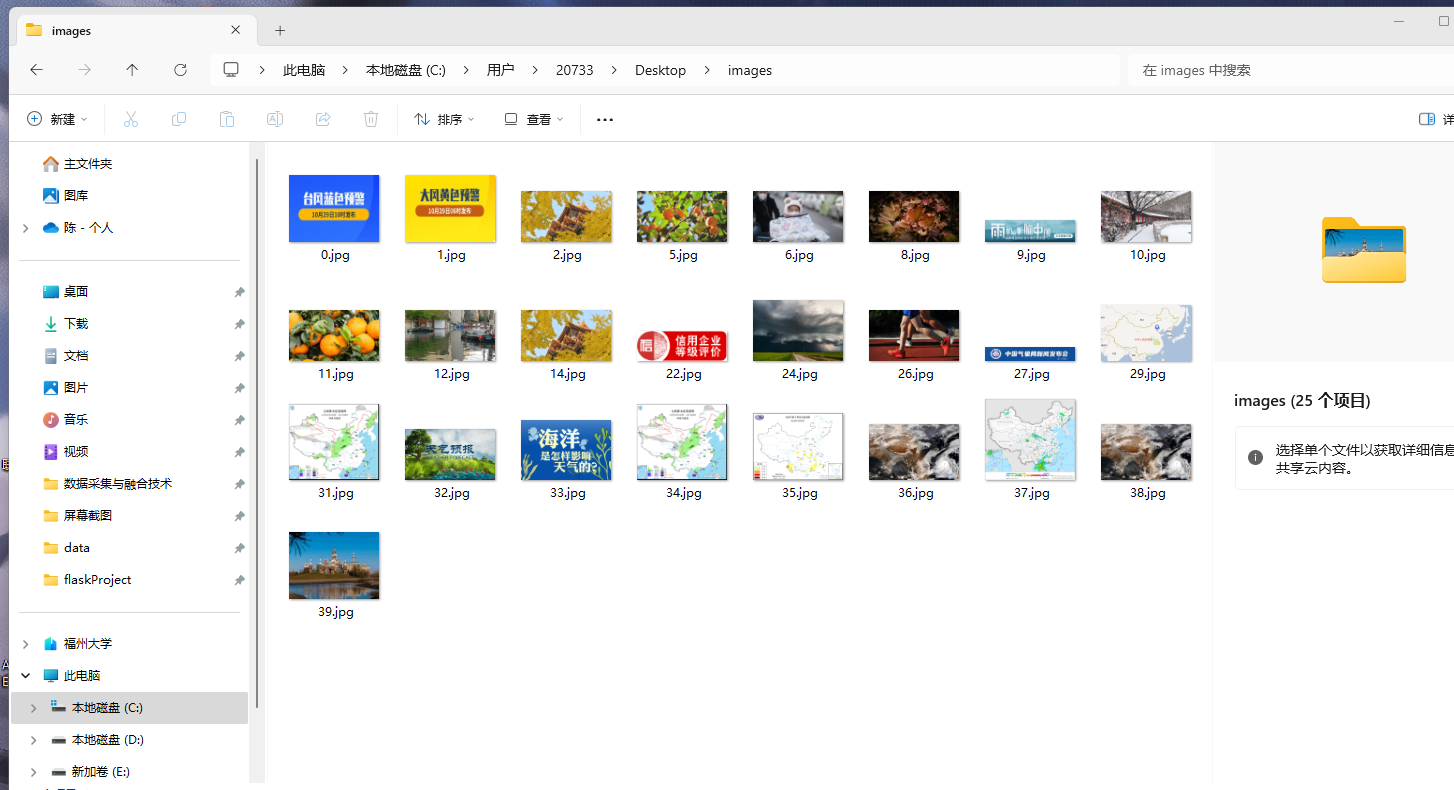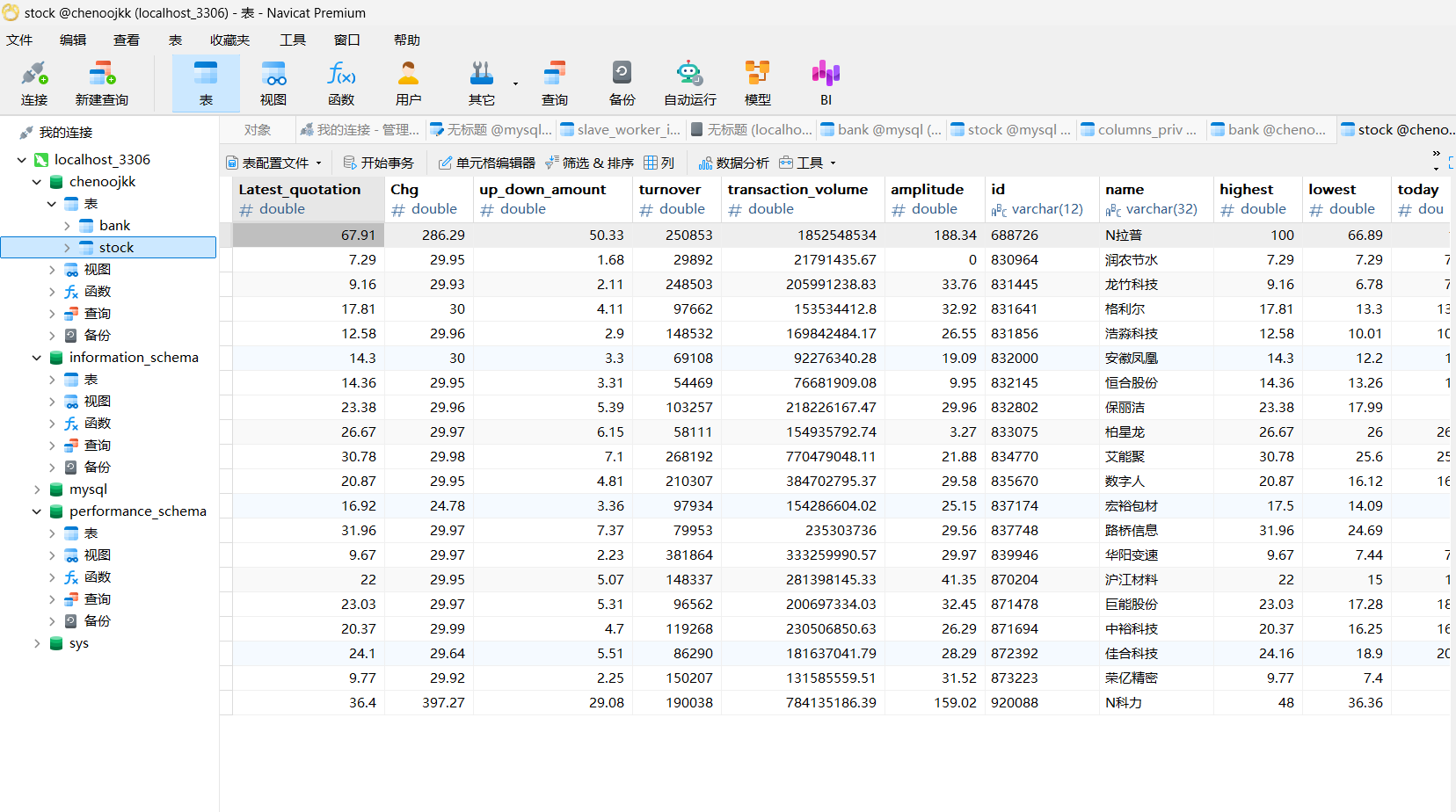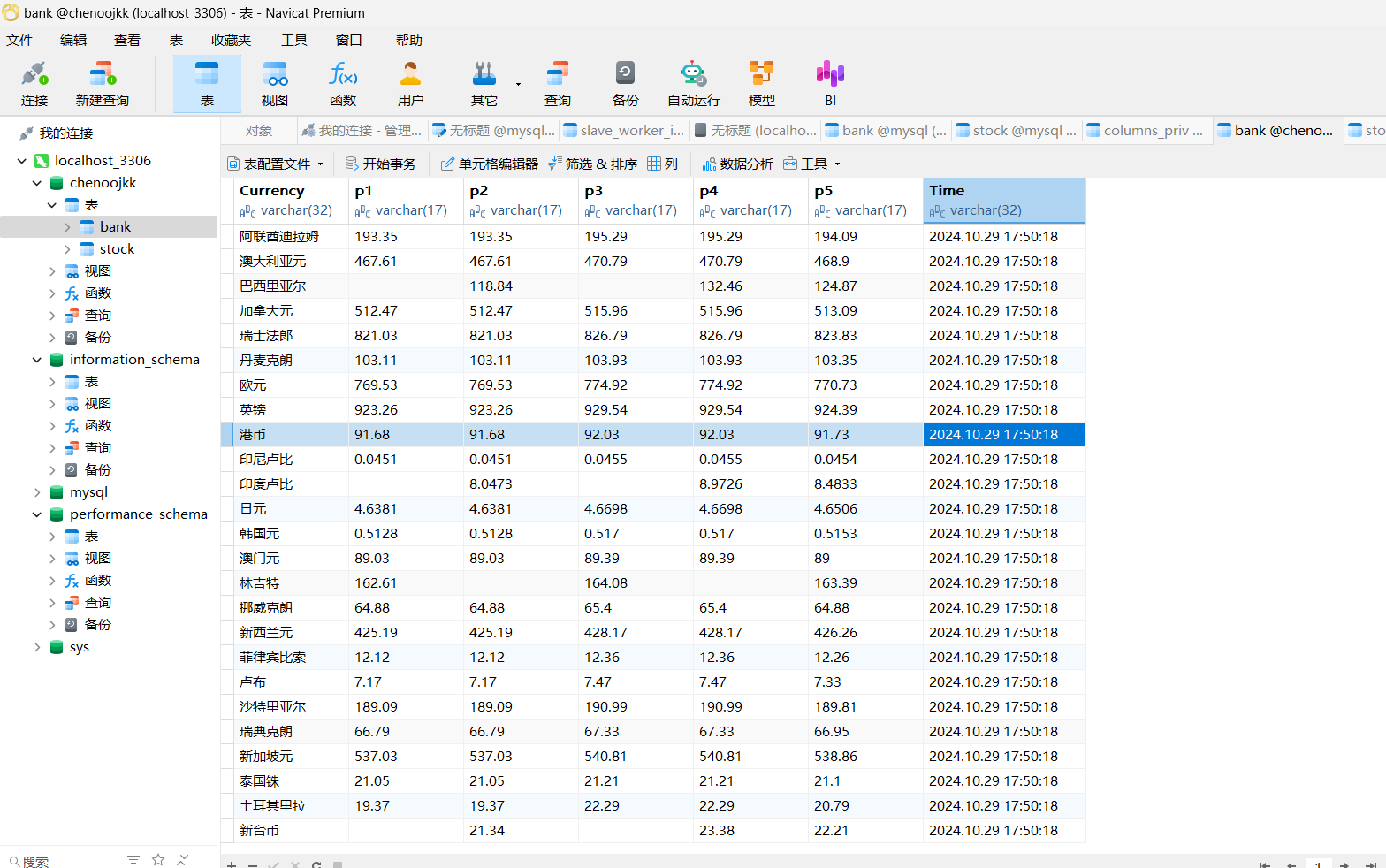2024数据采集与融合技术实践第三次作业
| 这个作业属于哪个课程 | <首页 - 2024数据采集与融合技术实践 - 福州大学 - 班级博客 - 博客园 (cnblogs.com)> |
|---|---|
| 这个作业要求在哪里 | <作业3 - 作业 - 2024数据采集与融合技术实践 - 班级博客 - 博客园 (cnblogs.com)> |
| 学号 | <102202126> |
一、作业内容
作业①
-
要求:指定一个网站,爬取这个网站中的所有的所有图片,例如:中国气象网(http://www.weather.com.cn)。使用scrapy框架分别实现单线程和多线程的方式爬取。务必控制总页数(学号尾数2位)、总下载的图片数量(尾数后3位)等限制爬取的措施。
-
代码如下
work.py import scrapy from Practical_work3.items import work1_Item class Work1Spider(scrapy.Spider): name = 'work1' # allowed_domains = ['www.weather.com.cn'] start_urls = ['http://www.weather.com.cn/'] def parse(self, response): data = response.body.decode() selector=scrapy.Selector(text=data) img_datas = selector.xpath('//a/img/@src') for img_data in img_datas: item = work1_Item() item['img_url'] = img_data.extract() yield item items.py import scrapy class work1_Item(scrapy.Item): # define the fields for your item here like: # name = scrapy.Field() img_url = scrapy.Field() pipelines.py import threading from itemadapter import ItemAdapter import urllib.request import os import pathlib from Practical_work3.items import work1_Item class work1_Pipeline: count = 0 desktopDir = str(pathlib.Path.home()).replace('\\','\\\\') + '\\Desktop' threads = [] def open_spider(self,spider): picture_path=self.desktopDir+'\\images' if os.path.exists(picture_path): # 判断文件夹是否存在 for root, dirs, files in os.walk(picture_path, topdown=False): for name in files: os.remove(os.path.join(root, name)) # 删除文件 for name in dirs: os.rmdir(os.path.join(root, name)) # 删除文件夹 os.rmdir(picture_path) # 删除文件夹 os.mkdir(picture_path) # 创建文件夹 # # 单线程 # def process_item(self, item, spider): # url = item['img_url'] # print(url) # img_data = urllib.request.urlopen(url=url).read() # img_path = self.desktopDir + '\\images\\' + str(self.count)+'.jpg' # with open(img_path, 'wb') as fp: # fp.write(img_data) # self.count = self.count + 1 # return item #多线程 def process_item(self, item, spider): if isinstance(item,work1_Item): url = item['img_url'] print(url) T=threading.Thread(target=self.download_img,args=(url,)) T.setDaemon(False) T.start() self.threads.append(T) return item def download_img(self,url): img_data = urllib.request.urlopen(url=url).read() img_path = self.desktopDir + '\\images\\' + str(self.count)+'.jpg' with open(img_path, 'wb') as fp: fp.write(img_data) self.count = self.count + 1 def close_spider(self,spider): for t in self.threads: t.join() -
输出信息:

-
Gitee文件夹链接:陈家凯第三次实践作业
-
心得体会:
- 单线程爬取:简单易懂,适合初学者。能够逐步掌握爬虫的基本逻辑,控制请求的频率,避免对目标网站造成过大压力。
- 多线程爬取:显著提升了爬取速度,但需要注意线程安全问题,以及对目标网站的请求频率控制,防止被封IP。
作业②
-
要求:熟练掌握 scrapy 中 Item、Pipeline 数据的序列化输出方法;使用scrapy框架+Xpath+MySQL数据库存储技术路线爬取股票相关信息。
-
代码如下
work.py from typing import Iterable import scrapy from scrapy.http import Request import re import json from Practical_work3.items import work2_Item class Work2Spider(scrapy.Spider): name = 'work2' # allowed_domains = ['25.push2.eastmoney.com'] start_urls = ['http://25.push2.eastmoney.com/api/qt/clist/get?cb=jQuery1124021313927342030325_1696658971596&pn=1&pz=20&po=1&np=1&ut=bd1d9ddb04089700cf9c27f6f7426281&fltt=2&invt=2&wbp2u=|0|0|0|web&fid=f3&fs=m:0+t:6,m:0+t:80,m:1+t:2,m:1+t:23,m:0+t:81+s:2048&fields=f2,f3,f4,f5,f6,f7,f12,f14,f15,f16,f17,f18&_=1696658971636'] def parse(self, response): data = response.body.decode() item = work2_Item() data = re.compile('"diff":\[(.*?)\]',re.S).findall(data) columns={'f2':'最新价','f3':'涨跌幅(%)','f4':'涨跌额','f5':'成交量','f6':'成交额','f7':'振幅(%)','f12':'代码','f14':'名称','f15':'最高', 'f16':'最低','f17':'今开','f18':'昨收'} for one_data in re.compile('\{(.*?)\}',re.S).findall(data[0]): data_dic = json.loads('{' + one_data + '}') for k,v in data_dic.items(): item[k] = v yield item items.py import scrapy class work2_Item(scrapy.Item): f2 = scrapy.Field() f3 = scrapy.Field() f4 = scrapy.Field() f5 = scrapy.Field() f6 = scrapy.Field() f7 = scrapy.Field() f12 = scrapy.Field() f14 = scrapy.Field() f15 = scrapy.Field() f16 = scrapy.Field() f17 = scrapy.Field() f18 = scrapy.Field() pipelines.py # Define your item pipelines here # # Don't forget to add your pipeline to the ITEM_PIPELINES setting # See: https://docs.scrapy.org/en/latest/topics/item-pipeline.html # useful for handling different item types with a single interface import threading from itemadapter import ItemAdapter import urllib.request import os import pathlib import pymysql from Practical_work3.items import work2_Item class work2_Pipeline: def open_spider(self, spider): try: self.db = pymysql.connect(host='127.0.0.1', user='root', passwd='Cjkmysql.', port=3306, charset='utf8', database='chenoojkk') self.cursor = self.db.cursor() self.cursor.execute('DROP TABLE IF EXISTS stock') sql = """CREATE TABLE stock(Latest_quotation Double,Chg Double,up_down_amount Double,turnover Double,transaction_volume Double, amplitude Double,id varchar(12) PRIMARY KEY,name varchar(32),highest Double, lowest Double,today Double,yesterday Double)""" self.cursor.execute(sql) except Exception as e: print(e) def process_item(self, item, spider): if isinstance(item, work2_Item): sql = """INSERT INTO stock VALUES (%f,%f,%f,%f,%f,%f,"%s","%s",%f,%f,%f,%f)""" % ( item['f2'], item['f3'], item['f4'], item['f5'], item['f6'], item['f7'], item['f12'], item['f14'], item['f15'], item['f16'], item['f17'], item['f18']) self.cursor.execute(sql) self.db.commit() return item def close_spider(self, spider): self.cursor.close() self.db.close() -
输出信息:

-
Gitee文件夹链接:陈家凯第三次实践作业
-
心得体会:
- 在存储数据时,我学习了如何使用Python的MySQL库连接数据库,执行插入和更新操作。合理的数据库设计(如表结构和索引)能显著提升数据存取效率。
- 在爬取过程中,遇到了一些问题,如网络请求失败或数据格式不符。通过设置异常处理机制和调试工具,我能够快速定位问题并进行修复,提高了爬虫的稳定性
作业③
-
要求:熟练掌握 scrapy 中 Item、Pipeline 数据的序列化输出方法;使用scrapy框架+Xpath+MySQL数据库存储技术路线爬取外汇网站数据。
-
代码如下(使用scrapy框架+Xpath+MySQL数据库)
work.py import scrapy from Practical_work3.items import work3_Item class Work3Spider(scrapy.Spider): name = 'work3' # allowed_domains = ['www.boc.cn'] start_urls = ['https://www.boc.cn/sourcedb/whpj/'] def parse(self, response): data = response.body.decode() selector=scrapy.Selector(text=data) data_lists = selector.xpath('//table[@align="left"]/tr') for data_list in data_lists: datas = data_list.xpath('.//td') if datas != []: item = work3_Item() keys = ['name','price1','price2','price3','price4','price5','date'] str_lists = datas.extract() for i in range(len(str_lists)-1): item[keys[i]] = str_lists[i].strip('<td class="pjrq"></td>').strip() yield item items.py import scrapy class work3_Item(scrapy.Item): name = scrapy.Field() price1 = scrapy.Field() price2 = scrapy.Field() price3 = scrapy.Field() price4 = scrapy.Field() price5 = scrapy.Field() date = scrapy.Field() pipelines.py # Define your item pipelines here # # Don't forget to add your pipeline to the ITEM_PIPELINES setting # See: https://docs.scrapy.org/en/latest/topics/item-pipeline.html # useful for handling different item types with a single interface import threading from itemadapter import ItemAdapter import urllib.request import os import pathlib import pymysql from Practical_work3.items import work3_Item class work3_Pipeline: def open_spider(self,spider): try: self.db = pymysql.connect(host='127.0.0.1', user='root', passwd='Cjkmysql.', port=3306,charset='utf8',database='chenoojkk') self.cursor = self.db.cursor() self.cursor.execute('DROP TABLE IF EXISTS bank') sql = """CREATE TABLE bank(Currency varchar(32),p1 varchar(17),p2 varchar(17),p3 varchar(17),p4 varchar(17),p5 varchar(17),Time varchar(32))""" self.cursor.execute(sql) except Exception as e: print(e) def process_item(self, item, spider): if isinstance(item,work3_Item): sql = 'INSERT INTO bank VALUES ("%s","%s","%s","%s","%s","%s","%s")' % (item['name'],item['price1'],item['price2'], item['price3'],item['price4'],item['price5'],item['date']) self.cursor.execute(sql) self.db.commit() return item def close_spider(self,spider): self.cursor.close() self.db.close() -
输出信息:

-
Gitee文件夹链接:陈家凯第三次实践作业
-
心得体会:
-
精准提取数据:XPath是一种非常灵活的选择器,能够高效地从HTML文档中提取所需的信息。在爬取外汇网站时,我通过编写XPath表达式准确抓取汇率、变动幅度等关键信息。
-
连接与数据存储:使用Python的MySQL库建立数据库连接,并执行SQL操作。设置适当的表结构和索引能够提高数据访问速度,特别是在处理大量数据时。
-

